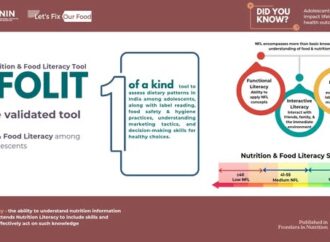 Food Manifest
Food Manifest
The house of resource for food safety.
ICMR
- Home
- ICMR

India Launches Teen Nutrition & Food Literacy Tracker0
- A to Z, Food Hygiene, Food Safety, Health & Wellness, News
- January 14, 2026
Key Development With ultra-processed foods and aggressive marketing of high-fat, salt, and sugar (HFSS) products increasingly targeting Indian adolescents, researchers at the Indian Council of Medical Research–National Institute of Nutrition (ICMR-NIN) set out to create a tool that measures nutrition and food literacy among young people. Introducing INFOLIT The researchers developed the Indian Nutrition and
READ MORE
ICMR Stresses Proper Cooking for Better Digestibility and Nutrient Retention0
- A to Z, Food Hygiene, Food Safety, Health & Wellness, News
- September 18, 2025
Key Update The Indian Council for Medical Research (ICMR) highlights that cooking improves the digestibility of most foods. Cooking softens food, makes it easier to chew, and enhances appearance, taste, flavour, and texture, which increases acceptability. The National Institute of Nutrition (NIN), Hyderabad, under ICMR, stresses the importance of using proper pre-cooking and cooking methods
READ MORE

ICMR-NIN to Display New Dietary Guidelines Across India0
- A to Z, Event, Food Hygiene, Food Safety, Health & Wellness, News
- July 22, 2025
Overview ICMR-National Institute of Nutrition (NIN) will soon display dietary guidelines on posters across schools, colleges, and central government offices. These “model posters,” developed with the Food Safety and Standards Authority of India (FSSAI), follow the Union Health Ministry’s new rules on oil and sugar consumption. What Do the New Guidelines Say? The posters advise
READ MORE
India’s Salt Problem: Scientists Push #PinchForAChange0
- A to Z, Food Hygiene, Food Laws, General, Health & Wellness, News
- July 16, 2025
Report Excessive salt intake is fueling a silent health crisis in India, increasing the risk of hypertension, stroke, heart disease, and kidney disorders, according to scientists at ICMR’s National Institute of Epidemiology (NIE). The World Health Organisation (WHO) recommends less than 5 grams of salt per person per day. However, studies show that urban Indians
READ MORE
ICMR-NIN Urges Health Tax on HFSS foods and Stricter Ad Rules0
- Food Hygiene, Food Safety, Health & Wellness, News
- April 15, 2025
Report The Indian Council of Medical Research–National Institute of Nutrition (ICMR-NIN) has recommended imposing a health tax on high-fat, high-sugar, and salt foods, i.e, HFSS foods. This move aims to curb obesity rates among Indian adolescents, which have been rising sharply in recent years. The consortium, under the Let’s Fix Our Food (LFOF) initiative, has called
READ MORE















